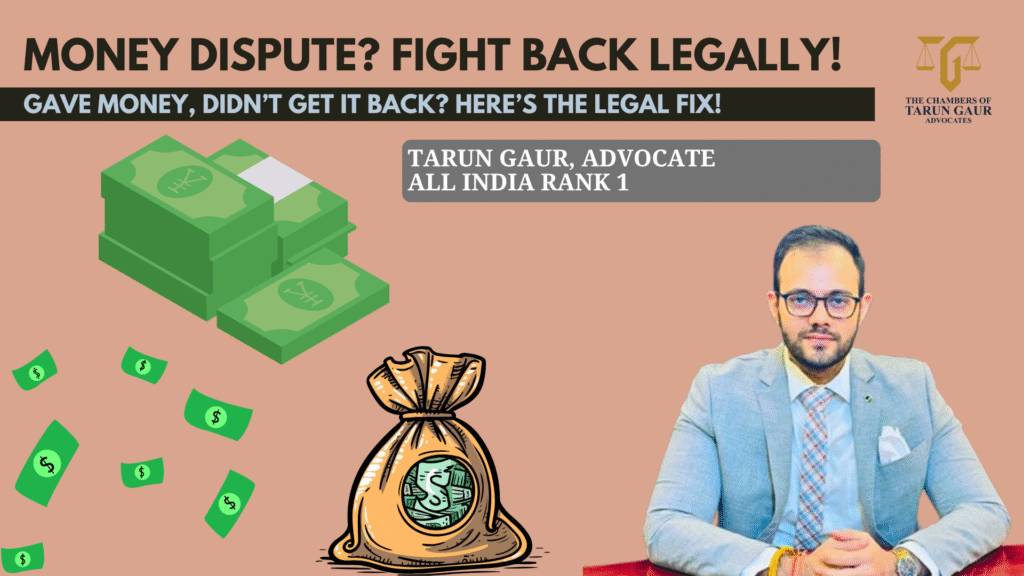Money disputes are among the most common legal battles in India — whether it’s a friend not returning a loan, a client withholding payment, or a cheque that bounces. For individuals, professionals, and businesses alike, recovering money legally can be a stressful yet unavoidable step.
Thankfully, Indian law offers a structured legal framework for recovering dues, whether through civil suits, criminal complaints, or alternate dispute resolution. In this blog, we break down the legal options, procedures, documents, and practical tips — so you know exactly what to do when someone owes you money.
📜 Legal Framework for Money Recovery in India
Money recovery cases typically fall under civil law, but in situations involving cheating or fraud, criminal proceedings may also apply. Here’s how Indian law helps:
⚖️ 1. Civil Remedies
a) Civil Suit for Recovery (Under CPC, 1908)
You can file a regular civil suit under Order IV Rule 1 of the Code of Civil Procedure, in a court that has both territorial and pecuniary jurisdiction.
Key requirements:
-
There must be a legally enforceable debt
-
The suit must be filed within 3 years (as per the Limitation Act, 1963)
-
You must have documentary evidence such as:
-
Loan agreements
-
Invoices or bills
-
Emails, chats, or signed notes
-
b) Summary Suit under Order XXXVII CPC
If you have a clear-cut written contract or cheque, use a summary suit — a fast-track option that limits the defendant’s ability to delay the case.
Applicable for:
-
Cheques, promissory notes, or bills of exchange
-
Written contracts with admitted liability
🛑 2. Criminal Remedies (When Fraud Is Involved)
If money was taken through dishonest means, criminal law under IPC or BNS can be invoked:
-
Section 406 IPC / Section 316 BNS: Criminal breach of trust
-
Section 420 IPC / Section 318 BNS: Cheating and dishonest inducement
Note: A criminal complaint does not replace a civil suit — but it increases legal pressure and highlights intent.
💳 3. Cheque Bounce Cases – Section 138 of NI Act
If a cheque issued towards repayment bounces, the Negotiable Instruments Act, 1881 provides a clear legal pathway:
Steps:
-
Send a legal notice within 30 days of cheque dishonour
-
If no payment is made in 15 days, file a complaint within 1 month of notice expiry
-
Punishment can be:
-
Jail up to 2 years
-
Fine up to twice the cheque amount
-
Or both
-
This is one of the most effective remedies for recovering smaller amounts with a clear paper trail.
🤝 4. Alternate Dispute Resolution (ADR)
In many cases, it’s practical to avoid litigation and resolve the matter faster through:
a) Arbitration
If your agreement has an arbitration clause, you can initiate proceedings under the Arbitration and Conciliation Act, 1996. This method is private, faster, and binding.
b) Mediation / Conciliation
Even during litigation, courts may refer parties to mediation. This is cost-effective, confidential, and often successful in maintaining future business relations.
🧾 5. Insolvency Proceedings (For Businesses or Individuals)
Under the Insolvency and Bankruptcy Code, 2016 (IBC):
-
A creditor (financial or operational) can file for insolvency if dues exceed ₹1 crore
-
Once admitted, an Insolvency Resolution Process begins, overseen by a professional
-
Useful in high-value business defaults, especially in the B2B space
📂 Documents Required for Money Recovery Cases
To build a strong case, keep the following:
-
Loan agreements or signed acknowledgments
-
Cheques, payment receipts, or bank transfer proof
-
Emails, chats, or SMS acknowledging the debt
-
Invoices or delivery challans (for commercial cases)
-
Legal notice and postal/courier tracking
💡 Practical Tips Before You File a Case
-
Always send a legal notice first — it’s mandatory in cheque bounce and useful in civil matters
-
Choose the appropriate forum: civil court, criminal court, or arbitration
-
Maintain calm, clear records and don’t confront the debtor aggressively
-
Consult a lawyer early — many cases fail due to technical errors or weak documentation
✅ Conclusion: Act Smart, Act Legally
Recovering your money doesn’t have to mean a long, painful legal battle — if you know the correct legal remedy and act strategically. Whether it’s a cheque bounce, breach of contract, or commercial default, Indian law provides powerful tools to recover your dues — if used promptly and properly.
👉 If you’re stuck in a money dispute, don’t delay. Seek advice from an experienced professional.
👨⚖️ Advocate Tarun Gaur (All India Rank 1)
Widely known as the Best Advocate in Dwarka, Tarun Gaur has successfully handled a wide range of money recovery, cheque bounce, and civil litigation cases across Delhi. His strategic, no-nonsense approach ensures that your financial rights are enforced efficiently.
💬 Reach out today and let the law work for you.
FAQs answered
Q1: What is the process of filing a civil suit for money recovery in India?
Q2: Can I file a criminal case if someone refuses to repay money?
Q3: What documents are required to recover money through legal action?
Q4: How effective is arbitration in money recovery matters?
Q5: What happens if a cheque issued for repayment bounces?

